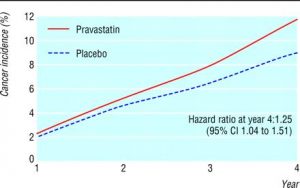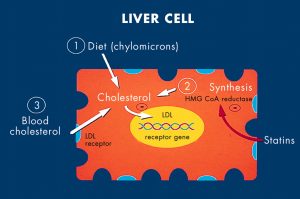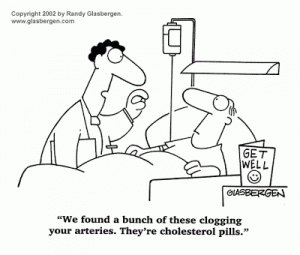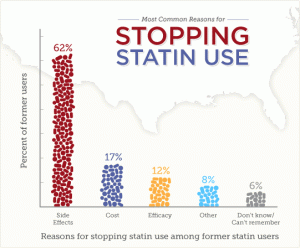By Dr. Shilpi Bhadra Mehta
This widespread belief that saturated fat is bad has led doctors to prescribe unnecessary, ineffective statins to prevent heart disease and high cholesterol and kept our focus off of the problem the decrease in saturated fats has created: obesity, an increase in refined carbohydrates and sweeteners.
In an attempt to be healthier, we have followed faulty advice and “compensated by replacing saturated fat with added sugar” (Dr. Malhotra). Though the intake of fat has declined, this increase in sugar and carbohydrates has resulted in an increase in obesity. Why? Food manufacturers have replaced the fat in low and no-fat foods with sweeteners to compensate for the pathetic taste in those fake foods.
In part 1 of “Saturated Fat: Friend or Foe?” we learned the truth about saturated fats and cholesterol: both are integral friends that are necessary for a healthy lifestyle. In part 2 we come face to face with our foes: statins, refined carbohydrates, and sweeteners.
Statins Are Not Your Friend
Statins are prescription drugs used to treat heart disease and high cholesterol. They are “the most profitable drugs in the history of Big Pharma. Presently, over 28% of all U.S. adults take a statin drug” (Dr.Brownstein). Statins are often prescribed when tests find an elevation of calcium in the arteries.
How Do We Know Statins Are Unfriendly?
One recent study published in the Journal of the American College of Cardiology measured calcium levels in patients in three different groups: those receiving high-intensity statin therapy, those receiving low-intensity statin therapy, and those receiving no statin therapy. The results showed not a decrease in coronary calcium levels but an increase in calcium levels in all three groups, which indicates the statins were unable to decrease calcium or slow its progression. In fact, the study concluded, “statins promote coronary atheroma calcification” (Rishi) – a condition normally considered worse for heart disease . This is one of many studies supporting the ineffectiveness of statins.
“Heart disease deaths started dropping 40 years ago and the rate of that decline is completely unchanged since statins came into widespread use. On a public health scale, statins are a failure” (Newman).
Statins are failing to do what the drug industry claims they do: prevent calcium buildup and, therefore, heart attacks and heart disease. Statins have also been associated with other medical issues, such as diabetes (Sattar), cataracts (Leuschen), muscle damage, liver damage, memory loss.
The CARE clinical trial suggested a significant risk of breast cancer with statins. After that, no patients with a family history of cancer was allowed in clinical trials of statin drugs!
If Statins Don’t Work, What Does?
It sounds archaic and almost too simple—eat an (Organic) apple a day! It’s proven, and an extensive study has been published in BMJ. Researchers “modeled the effect on vascular mortality of prescribing everybody in the UK over 50 years old either an apple (Malus domestica) a day or a statin a day, estimated the number of adverse events, and compared the subsequent drug, or fruit, costs…[The researchers found] that a 150 year old proverb [an apple a day keeps the doctor away] is able to match modern medicine and is likely to have fewer side effects” (Briggs). Additional benefits that may be realized when consuming apples include a decreased risk of many cancers, diabetes, and Parkinson’s, constipation relief, and weight control.
In addition, “fish-source omega-3s enjoy ample lab evidence of heart benefits, and a healthy majority of epidemiological studies link fish-rich diets to lower risks for heart disease and its adverse outcomes” (Weatherby, 2015). Fish and fish oils not only have major heart-health benefits, they also enhance brain function, provide vitamin D, lower the risk of depression, and much more.
The Real Enemy: Refined Carbohydrates and Sweeteners
Excess carbohydrates from any source are far worse than saturated fat. Fake fats and industrial fats and oils created in a laboratory in the last 50 years, such as canola, safflower, sunflower, soybean, cottonseed, Crisco, trans-fat, vegetable shortening, are the root cause of many health issues. Traditional fats and oils, such as butter, ghee, dark chocolate, lard, tallow, duck and goose fat, cold-pressed olive and sesame seed oil, avocado, coconut oil, and palm oil, have been eaten for thousands of years and and have many different health benefits.
The Experts Weigh In
Professor David Haslam, chair of Britain’s National Obesity Forum said, “The assumption has been that increased fat in the blood is caused by increased saturated fat in the diet, whereas modern scientific evidence is proving that refined carbohydrates and sugar are actually the culprits.”
“The Journal of the American Medical Association published a study showing that—compared with a low carbohydrate, low glycemic index (GI) diet—a low-fat diet caused the greatest drop in calorie burning, an unhealthy lipid (blood fats) profile, and more insulin resistance (pre-diabetes)” (Weatherby, 2013).
In a recent article, endocrinologist Professor Robert Lustig shed some light on the subject of sugar and fat: “When saturated fat got mixed up with the high sugar added to processed food in the second half of the 20th century, it got a bad name.” Lustig also stated, “Which is worse, the saturated fat or the added sugar? The American Heart Association has weighed in—the sugar many times over. Plus added sugar causes all of the diseases associated with metabolic syndrome” (also known as prediabets) – (Dr. Malhotra)
Conclusion
Saturated fats and cholesterol are friends and should be a significant part of any healthy diet. More and more studies are showing the ill effects of the real enemies: carbohydrates and sugars. But don’t take the experts’ word for it; do your own study.
Eliminate refined carbohydrates and sweeteners from your diet, and replace them with your new friends. These new friends (perhaps old friends from the past) would include real food items like avocado, animal and seafood fats, full fat dairy (if tolerated), extra virgin coconut oil, palm oil, cold pressed extra virgin olive oil (cold and low temperature use only), vegetables, low to moderate amounts of fruit, seeds, and tree nuts (depending on your metabolism and goals).
Eliminate deadly trans fats found today in almost all processed foods in the grocery shelf or mixes such as baked goods, pastries, breads, sweets, cakes, biscuits, etc. You will want to avoid FRUIT JUICE and dried fruit due to their ability to rapidly raise blood sugar and insulin, which can block weight loss. Try eating real food and let your own physical and mental health be your proof.
Resources
Brownstein, David. “Are You Fatigued & Don’t Know Why?” Dr. Brownstein’s Holistic Medicine (April 5, 2015): accessed 5/13/15.http://blog.drbrownstein.com/statins-worsen-coronary-calcium-scores/.
Leuschen, J, et al. “Association of Statin Use with Cataracts: A Propensity Score-Matched Analysis.” PubMed (November 13, 2013): accessed 5/13/15. http://www.ncbi.nlm.nih.gov/pubmed/24052188.
Newman, David. “The Statin Insanity.” Huffpost Healthy Living (November 15, 2013): accessed 5/13/15. http://www.huffingtonpost.com/david-h-newman-md/statins_b_4277001.html.
Malhotra, Aseem. “Saturated Fat Is Not the Major Issue.” BMJ (Oct. 22, 2013): accessed 5/13/15. http://www.bmj.com/content/347/bmj.f6340.
McDougall, Jean, et al. “Long-term statin use and risk of ductal and lobular breast cancer among women 55-74 years of age.” July 5, 2013. accessed 06/26/15. http://cebp.aacrjournals.org/content/early/2013/07/04/1055-9965.EPI-13-0414.abstract
Puri, Rishi, et al. “Impact of Statins on Serial Coronary Calcification During Atheroma Progression and Regression.” Journal of the American College of Cardiology (April 17, 2015). v. 65, issue 13 (1283–1285).
Sattar, N, et al. “Statins and Risk of Incident Diabetes: A Collaborative Meta-Analysis of Randomised Statin Trials.” PubMed (February 27, 2010): accessed 5/13/15. http://www.ncbi.nlm.nih.gov/pubmed/%2020167359.
Weatherby, Craig. “Heart-Diet Myths Get a Busting: Dr. Malhotra Cardiologist Rebuts Conventional Wisdom on Fat and Cholesterol in Major Medical Journal.” Vital Choice (October. 24, 2013): accessed 5/13/15. http://www.vitalchoice.com/shop/pc/articlesView.asp?id=2092.



